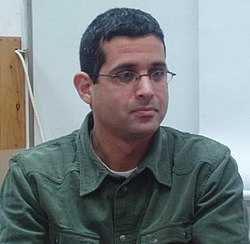Assaf Inbari
An editor has nominated this article for deletion. You are welcome to participate in the deletion discussion, which will decide whether or not to retain it. |
Assaf Inbari אסף ענברי | |
|---|---|
 | |
| Born | 1968 |
| Occupation | Writer, novelist and journalist |
| Nationality | Israeli |
| Notable works | Home (Template:Lang-he-n) |
| Notable awards | |
Assaf Inbari (Template:Lang-he-n) (born 1968) is an Israeli writer, novelist and journalist. He currently teaches at Kinneret College and Alma College in Tel Aviv.
Biography
Inbari was born and raised on Kibbutz Afikim,[1] the oldest of three children, and lived there until the age of 20.[2] He studied Hebrew and comparative literature at Tel Aviv and Bar-Ilan Universities and completed his Ph.D. on the poetry of Hayam Bialik in 2008.[2]
In 2005, he married his wife Naomi; the couple has one son. He lives on Kibbutz Degania B (although not a member).
Literary career
Inbari writes extensively for the Hebrew press and has published essays and short stories in a variety of journals.
In 2009 he published his first novel Home (Template:Lang-he-n). It relates the history of Afikim over three generations, from its founding in the Jordan Valley in the early 1930s by members of the socialist–Zionist youth movement Hashomer Hatzair, through its growth and development, to its present form, beset by privatization and individualism.[3] The novel was awarded the 2010 Israel Book Publishers Association's Platinum Prize[4] and was on the shortlist of finalists for the Sapir Prize for Literature.[5]
Bibliography
Fiction
- Home (Template:Lang-he-n) (Yedioth Ahronoth/Hemed Books, 2009) [Hebrew].
Essays
- "The Kibbutz Novel as Erotic Melodrama" (March 2012), Vol. 31, No. 1 Journal of Israeli History, pp. 129-146.
- "The Spectacles of Isaiah Berlin" (Spring 2006), Azure, pp. 82-112.
- "Towards A Hebrew Literature" (Spring 2000), Azure, pp. 99-154.
- "Zionism's New Challenge" (Winter 2008), Azure, pp. 81-109.
Articles
- "The Age of Post-Nostalgia", Haaretz, 15 September 2012.
- "The End of the Secular Majority", Haaretz, 3 February 2012.
- "The Finishing Touch", Eretz acheret, 17 September 2009.
- "New Age: The Fall of the Secular State", Haaretz, September 1999.
References
- ^ Avraham Balaban (18 June 2009), "Israeli History / Clowns in the Dining Room", Haaretz (retrieved 17 November 2012).
- ^ a b Institute for the Translation of Hebrew Literature, New Books from Israel: Fall 2009, p. 19 (retrieved 17 November 2012).
- ^ Shula Keshet. "Producing the (Eretz-) Israeli place: on the documentary urge in kibbutz literature". Hebrew Studies Journal. 52 (Annual 2011): 235+. Academic OneFile. GALE|A276518170. Retrieved November 18, 2012
- ^ Institute for the Translation of Hebrew Literature, "Assaf Inbari" (retrieved 17 November 2012).
- ^ Greer Fay Cashman (25 March 2011), "Yoram Kaniuk's War of Independence memoir wins Sapir Prize", The Jerusalem Post (retrieved 17 November 2012).
